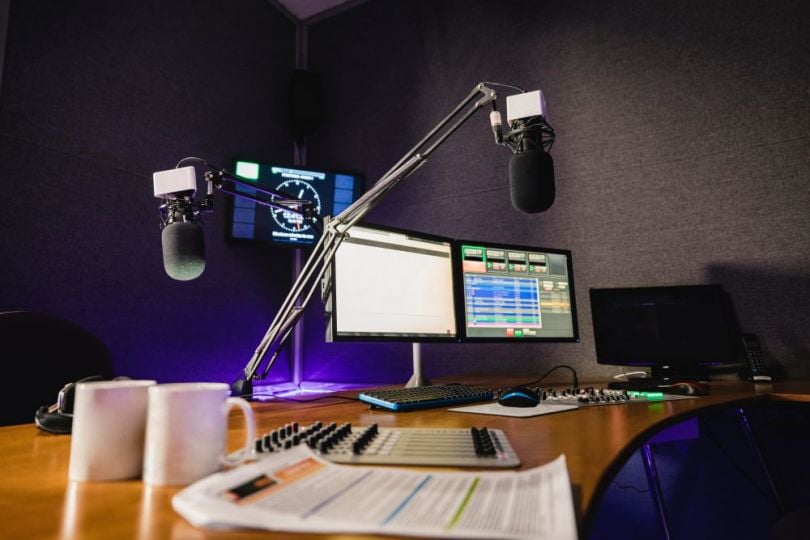For most tech companies, blogging is the obvious first step into content marketing, but many eventually find themselves asking: Should we start a podcast too?
The answer varies, depending on whom you ask.
Some people, like Christopher Lochhead, believe podcasting is an absolute must if you’re trying to position your company as an industry innovator and thought leader.
“If you don’t have a podcast today — from a marketing perspective, as a company — you’re insane,” the former CMO said on the ABM Conversations podcast.
A tech company without a podcast, Lochhead continued, is “like not having a website.”
But many marketers don’t think the juice is worth the squeeze.

Producing a podcast that consistently delivers value to listeners takes time and effort — more than people think — and some marketers suspect a company’s resources are better allocated elsewhere.
Podcasting “requires as much, if not more, effort as any other marketing program you’re running,” Lauren Patrick, vice president of marketing at Curricula, told Built In, “because you have to create an editorial calendar for all the episodes you’re going to produce, plus how you’re going to promote it.”
Podcasts may help drive brand awareness, she said, but marketers hoping they will result in listeners moving down the funnel may want to adjust their expectations.
“If your goal is to generate leads that then convert to revenue, a webinar is a much better way to go,” Patrick added.
“If your goal is to generate leads that then convert to revenue, a webinar is a much better way to go.”
Jill Salzman has similar thoughts on B2B podcasting. While she’s a proponent of the medium — she launched her second podcast in 2020 — she cautions first-time business podcasters to not expect the needle to automatically move too much.
She speaks from experience: When Salzman started her first podcast in 2014, she assumed that a growing listenership would inevitably result in more leads and sales for her business. So she was disappointed when she learned that wasn’t the case.
“We were just sure that folks would start converting,” she told Built In. “They did not.”
She found that producing a podcast can be a great tool for businesses to go deeper with their communities, and that it sometimes drives new people to sign up for newsletters. But after her early experience, Salzman said, “I don’t expect leads or sales [from it] anymore.”
The data suggests she’s not alone. According to Content Marketing Institute’s research, only 9 percent of marketers surveyed said they found podcasts to be most effective in the later stages of the buyer’s journey, when used for demand generation purposes. Sixty percent said podcasts were most effective for sparking awareness and interest.
Reasons to Start a B2B Podcast
So what should marketers expect from launching a B2B podcast, if it’s not directly setting up leads or sales?
Get Your Name Out There
Greg Holtzman recently launched a podcast for Brainbase, where he serves as the director of marketing partnerships and communications. He said podcasting has been a great medium for sharing expertise and building trust in the intellectual property licensing industry, where Brainbase is an emerging player.
“When we started the Brainbase podcast, we had very little brand awareness, and believed [podcasting] would be a terrific tool to change that,” Holtzman told Built In.
By interviewing industry leaders, Holtzman hopes the podcast draws attention to his company, even if the podcast isn’t about the company. He’s encouraged by the early results.
“I can definitely say that more people know Brainbase now,” he said. “Although we have not closed any new customers yet who found us through the podcast, it’s generated leads and new conversations.”
Gain Credibility in a Niche
Ash Read, editorial director at Buffer, produced a documentary-style limited-series podcast called Breaking Brand for his company. The podcast follows the direct-to-consumer branding agency Gin Lane as it starts a DTC business of its own.
This may seem like a random foray for Buffer, considering the company makes software tools for social media managers. But Read told Built In that, by telling Gin Lane’s story well, and interviewing key players in the e-commerce industry along the way, “it’s instant credibility for Buffer in that audience.”
Buffer is already popular with small businesses and freelancers, Read explained. So by going deeper and narrower with a specific industry that may benefit from using Buffer’s product, the podcast series lends them some authority and generates goodwill with a target audience.
“I think you can obsess over conversions. But I don’t think that’s what a podcast is for,” Read added. “I think podcasts are for building an audience of people who care about your brand. Through podcasting, can we build an audience of people that look like our ideal customers?”
Lead the Industry-Wide Conversation
Marcus LaRobardiere, the director of marketing at NewStore, recently started a podcast too.
One of his biggest reasons for doing so is that his company, which makes software for retail brands, wants to assert itself as a leading voice in an industry-wide conversation.
Podcasting is “a way for NewStore to insert themselves into a conversation, where we could champion the industry and champion the store associates and the people that are driving it forward,” LaRobardiere told Built In.
“The goal there was obviously to help fuel the marketing engine, but also help be a part of ... a more-broad conversation about the retail industry — and celebrating it.”
LaRobardiere has a hunch that, by leading a conversation about the state of the industry, rather than discussing NewStore’s product itself, the company will be better positioned in the minds of prospective customers in the long run.
Create Repurposable Content
The top benefit that marketers mentioned about podcasting is that, when done well, it provides material that can be chopped up and spun out into several standalone pieces of content.
A 30-minute audio conversation can be transcribed and published as a series of blog posts, a handful of social media posts and even remixed into YouTube videos, in addition to being pushed out as a podcast episode.
For content marketers who prioritize efficiency and are trying to squeeze as much material out of a single interview as possible, “podcasting is just a really easy way to do that,” LaRobardiere said.
For him, that alone makes podcasting worth the effort.
And It Is Effort
The marketers interviewed for this article all emphasized that starting a podcast isn’t as easy as it looks. Doing it well requires investment and consistency.
And, “just because you can start a podcast probably doesn’t mean you should,” Read said.
His advice for B2B marketers considering starting one of their own: Before diving in, determine what you and your company can contribute to the podcasting world that nobody else is.
“Before you stress about anything production-wise,” Read said, ask yourself what will make your podcast different from the rest.
“The world doesn’t need to hear you talking to other people in your industry,” he added, “unless there’s something unique to say.”




